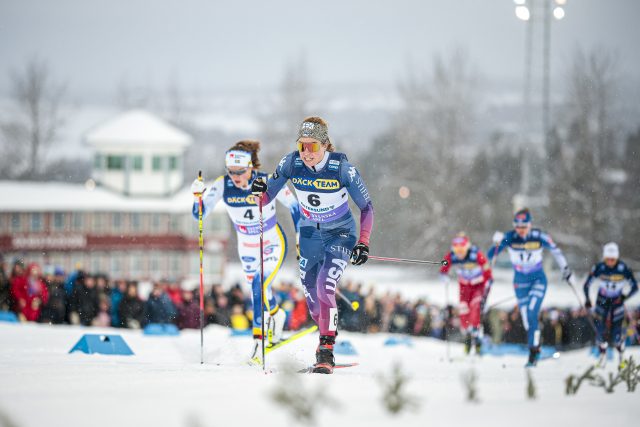 This coverage is made possible through the generous support of Marty and Kathy Hall and A Hall Mark of Excellence Award. To learn more about A Hall Mark of Excellence Award, or to learn how you can support FasterSkier’s coverage, please contact info@fasterskier.com.
This coverage is made possible through the generous support of Marty and Kathy Hall and A Hall Mark of Excellence Award. To learn more about A Hall Mark of Excellence Award, or to learn how you can support FasterSkier’s coverage, please contact info@fasterskier.com.

No one wants to be remembered for their worst moment, but the head of the Swedish cross-country ski team, Lars Oberg, will struggle for a long time to live down his regrettable lapse in the final of the Women’s Classic sprint last Saturday in Ostersund, Sweden. In a moment that went by in a flash, Oberg stepped out onto the Sprint course while encouraging his athletes, his position in the lane interfering with Rosie Brennan (USA). This transgression happened 3:15 into the race—just before the straightaway to the sprint finish—while Brennan was in third place and battling for finishing position. She ultimately finished fourth, missing the podium by a little over one second. Those who wish to view the incident can see it on skiandsnowboardlive.com, at hour 1:53:02 of their race coverage.
While the incident was brief, the outrage was not. Immediately, a Norwegian coach (Eirik Myhr) who was standing next to Oberg lashed out at him for the infringement. Myhr’s anger was palpable.
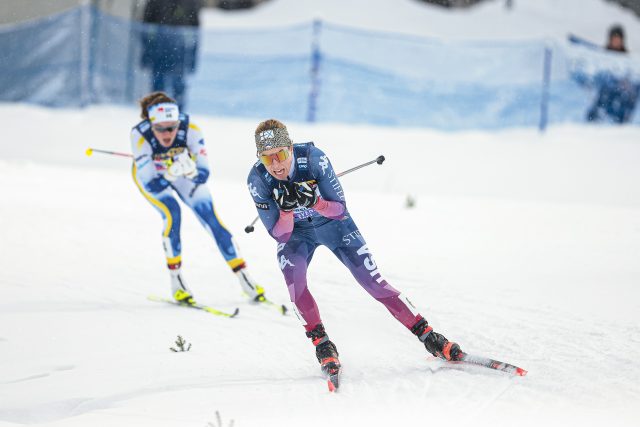
The Fallout
The American team has taken the high road in response to the incident. In her post race media statements, Brennan referred to the incident as “a little mishap.” She continued that, “It’s hard to know how much that impacted the race, or not, but that’s not something you ever want to wonder about.”
In comments directly to FasterSkier Brennan said that, “Its not worth spending too much energy [on] as there is nothing anyone can do to change what’s already happened. I just hope it was a moment for all staff to think about how they support their own athletes while also respecting the competition. I hope it never happens to anyone again.”
U.S. Head Coach Matt Whitcomb also took a generous view of the infraction. “I talked to (Oberg) after the race,” Whitcomb said. “He’s a friend of the team and a really wonderful guy. He came straight to us to apologize. Whitcomb continued that Oberg said that he was ‘so sorry, I was just excited’.”
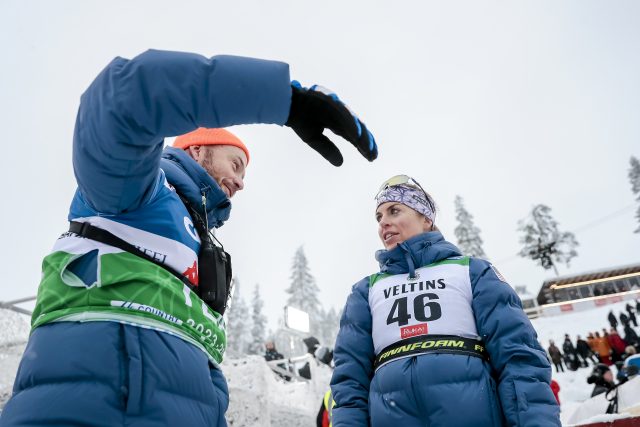
Whitcomb empathized with the Swedish coach. “I get it, we’re all just humans focused on our team, somewhat myopically sometimes,” Whitcomb said. “It’s easy to imagine that happening to me. It’s probably our worst nightmare as a coach.”
Whitcomb expressed that he was satisfied with how the incident was handled. “It’s an honest mistake,” Whitcomb continued. “He feels terrible, and I understand it. His apology meant a lot; we heard it and accept it. I feel strongly that … it’s important that we debrief about it and remind coaches that we need to be careful and not impede the race.”
Whitcomb also said that Oberg asked him to set up a meeting between him and Brennan so that he could apologize in person. Brennan told FasterSkier that she had, in fact, spoken with Oberg on the phone and that he apologized to her. “I appreciate the acknowledgement of the wrongdoing,” she said. “Given that it was so visible on TV, I chose to trust that the jury would apply an appropriate penalty.”
To his credit, Oberg has taken full responsibility and blame for the incident. “It was incredibly rude of me,” Oberg told European media. “I got too close to the track. It’s really sad but I can’t rewind the tape. I have to take responsibility for it and have apologized. It was a pure accident.”
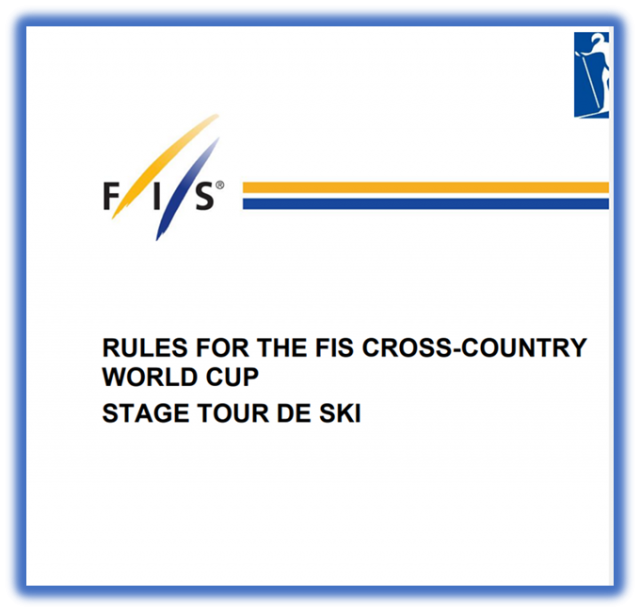
The Penalty
The International Ski Federation (FIS) stepped in to handle the situation, fining Oberg 500 Swiss Francs, equaling $568 US dollars (the coach’s ski federation generally pays such fines). Oberg was cited under FIS rule 343.9, governing obstruction. He also had his accreditation removed for the next day’s racing; the practical effect of that last sanction is questionable. FIS’ penalty logs describe the incident as, “The coach was running next to the course and was too close and impeded an American athlete.” The dry bureaucratic language belied the raw emotion of the moment.

It was an interesting choice for FIS to use section 343.9 for sanctions since this rule is generally reserved for athletes, and specifically refers to competitors not obstructing other competitors. FIS had the option to proceed under the General Conditions category by using rule 223.1.1 regarding “unsportsmanlike conduct.” Either way, FIS chose to not throw the book at Oberg, most likely because of the inadvertent nature of the offense. Violators of FIS rules may face a maximum fine of CHF 100, 000 (about $113,600 USD) for violations. So clearly, there was a lot of latitude for FIS authorities to have been far more harsh.
The FIS Media Coordinator offered a very circumspect response, telling FasterSkier that the decision came from the race jury. “As for now there is no change in how coaches are allowed access during the race,” the coordinator said. “We have coaching zones that they should stay in during the races. And that was used during Sunday’s race without any problems. We hope this will not happen again.”
Team USA’s diplomatic responses notwithstanding, the implications for Brennan were significant. There is no way to know the full impact of the interference; on the World Cup every inch matters. Also, Brennan is in a pitched battle for the overall standings. At the weekend’s conclusion of racing, she was in second place overall, one point ahead of Emma Ribom (SWE), so the handful of points Brennan potentially missed out on could prove critical down the road.
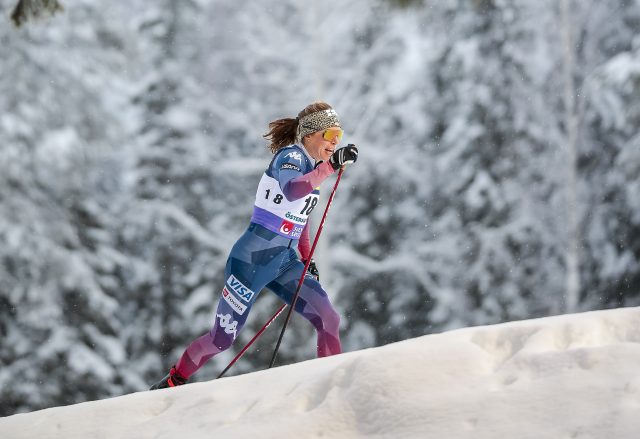
Additionally, there are the financial implications: podiums pay. Sponsors love to see their athletes on the podium; Brennan was potentially deprived of that opportunity. There’s also the increased payout for finishing third instead of fourth; that difference is CHF 700 ($ 797 USD).
Is a $568 fine appropriate for the violation? FIS fines athletes CHF250 ($284 USD) for delivering skis late to equipment control. So, is a doubling that penalty appropriate when an act of negligence potentially affects a race outcome?
One thing is for sure, everyone feels bad about it. All parties expressed regret about the misfortune, and no one is out for blood. Oberg will carry this “scarlet letter” with him through the rest of his career, but Rosie will never be able to be given full satisfaction to make her whole.

Perhaps, a starting point might be this: an appropriate penalty might be a fine which equals the difference in prize money potentially lost, plus additional money as compensation for possible missing Cup points and sponsor attention. And the money should go to Brennan instead of to FIS! While no amount of money will ever be able to turn back the clock to put Brennan onto the podium—if that was what may have happened—it’s the only form of compensation our society has to offer. The coach’s “mea culpa” is nice, but that only goes so far. The larger the penalty, the larger the deterrent to future violations: with there being so much room left in FIS’s penalty toolbox, it seems that more could have been done to seek an appropriate solution.
